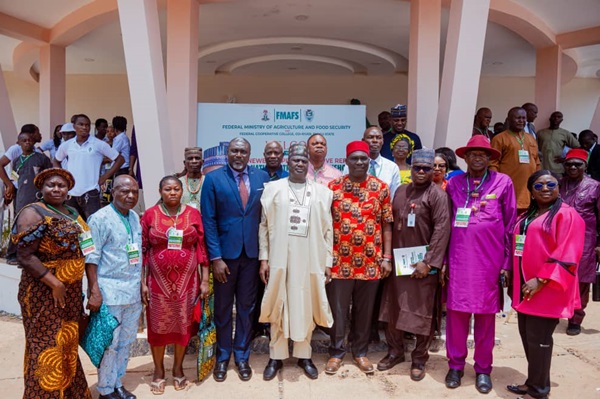
The Minister of State for Agriculture and Food Security, Sen. Aliyu Abdullahi, has said that revitalising Nigeria’s cooperative sector will foster economic empowerment and prosperity for citizens, positioning cooperatives to play a key role in achieving a $1 trillion economy within the decade.
He made this statement during the flag-off of the National Training/Workshop for Trustees, Management Committee Members and Managers of Cooperative Societies in Nigeria, held at the Federal Cooperative College, Oji River, Enugu State. The event was organised for stakeholders from the southeast and south-south regions.
Highlighting the global impact of cooperatives, the minister noted that the 300 largest cooperatives worldwide generate a combined turnover of $2.4 trillion, underscoring their pivotal role in economic growth and social development. He further stressed that cooperatives are instrumental in reducing hunger and alleviating poverty, especially through agricultural initiatives, which account for 35 per cent of the global cooperative asset base and turnover.
“This training marks the beginning of broader efforts to rejuvenate the cooperative sector. We are carrying everyone along and showing that this administration has the political will to empower Nigerians through cooperatives,” Abdullahi stated.
He explained that the capacity-building program is part of a strategic blueprint for the sector’s revitalisation. According to him, the Federal Government’s ‘Renewed Hope Cooperative Reform and Revamp Programme’ includes a series of interventions aimed at improving cooperative governance and impact.
Key objectives of the reform include: A comprehensive review of the Nigerian Cooperative Societies Act (N98 LFN 2004) to reflect current realities and technology; Development and launch of a new National Policy for Cooperative Development & Growth (2025); Establishment of a national regulatory framework and standard operating guidelines for cooperative activities and creation of a cooperative-owned bank to serve the financial needs of members.
Abdullahi emphasised that the era of fake or unregistered cooperative societies is over, noting that a National Council on Cooperative Affairs will soon be convened to ensure synergy between federal and state cooperative ecosystems.
He announced that the southwest edition of the training will hold at the Federal Cooperative College, Ibadan, on April 29–30, 2025. In addition, a National Cooperative Summit focused on food security will bring together stakeholders from all six geopolitical zones in Abuja before the end of Q2 2025.
The minister also commended the efforts of the provosts of Federal Cooperative Colleges in the South-East and South-South for aligning with the federal government’s vision for cooperative reform under President Bola Tinubu’s administration.
Speaking at the event, the provost and CEO of the Federal Cooperative College, Oji River, Dr. Jude Ejikeme, described the workshop as an important platform for not only delivering intensive training but also fostering dialogue between stakeholders and policymakers.
“This workshop allows participants to engage with the minister, share perspectives and offer suggestions on how best to implement the Renewed Hope agenda in their zones. We expect to gain valuable insights into stakeholders’ expectations from the government,” Ejikeme said.
He added that the training would cover both the foundational principles of cooperative management and the critical skills required to navigate the evolving economic landscape.
A statement issued by the ministry’s director of information, Ikemefuna Ezeaja noted that highlights of the event included an inspection tour of the college by the Minister and the official unveiling of four new vehicles for the college: one coaster bus, one 18-seater bus and two Hilux utility vehicles.


